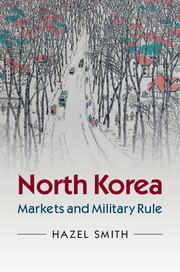Book contents
- Frontmatter
- Dedication
- Contents
- Acknowledgements
- Introduction: North Korea: politics, economy and society
- Part I Jettisoning caricatures: understanding history
- Part II The rise and fall of Kim Il Sungism
- Part III Marketisation and military rule
- 9 Marketisation from below
- 10 Military rule from above
- 11 The marketisation of well-being
- 12 The marketisation of the social structure
- 13 Going nuclear
- 14 Strategic paralysis
- 15 North Koreans as agents of change
- Bibliography
- Index
13 - Going nuclear
from Part III - Marketisation and military rule
Published online by Cambridge University Press: 05 May 2015
- Frontmatter
- Dedication
- Contents
- Acknowledgements
- Introduction: North Korea: politics, economy and society
- Part I Jettisoning caricatures: understanding history
- Part II The rise and fall of Kim Il Sungism
- Part III Marketisation and military rule
- 9 Marketisation from below
- 10 Military rule from above
- 11 The marketisation of well-being
- 12 The marketisation of the social structure
- 13 Going nuclear
- 14 Strategic paralysis
- 15 North Koreans as agents of change
- Bibliography
- Index
Summary
Military-first era governments used diplomacy and military deterrence to pursue regime security goals but, in the absence of a strong civilian or political counterweight to military-first logic, foreign policy evolved into that of ‘nuclear deterrence first – diplomacy second'.
The central goal of early military-first era foreign policy was to achieve normalisation of diplomatic relations with the United States. Military-first foreign policy pursued bilateral engagement with the United States and also engaged in diplomatic outreach worldwide to states of all ideological hues. The objective was to reduce North Korea's diplomatic isolation abroad, to enhance regime security and to obtain support for economic redevelopment. Kim Jong Il's government presided over a historic rapprochement with South Korea and rebuilt relationships with Russia and China.
Military-first government recalibrated their security policy after the 2000 election of George Bush, as DPRK decision-makers viewed activist United States foreign policy as heralding a military attack on North Korea. Military-first governments were not confident that their conventional armed forces could withstand military intervention and reasoned that they could use scientific expertise, technology and thefissile materials they possessed to develop a nuclear weapons capacity. The aim was to provide effective deterrence against foreign invasions. North Korea's decision to vigorously pursue the development of nuclear weapons precipitated what became known as the ‘second nuclear crisis'.
The military logic that underpinned DPRK domestic and foreign policy viewed political problems through a militarised lens in which thefirst choice of solution was via military means. Military-first era national security policy evolved to explicitly constitute regime security around the possession of an independently controlled nuclear weapons capacity. In 2013 Kim Jong Un announced that diplomacy and deterrence remained the foreign policy instruments of the military-first era but, in practice, the balance between the two was skewed so that nuclear deterrence remained the core of security policy.
- Type
- Chapter
- Information
- North KoreaMarkets and Military Rule, pp. 294 - 311Publisher: Cambridge University PressPrint publication year: 2015



